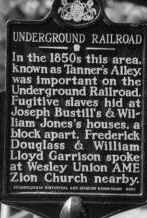
Study Areas
July 1821: Benjamin Journey, tavern servant, escapes from Georgetown
One
Hundred
Dollars
Reward.
Ran away from the subscriber, from the Union Tavern, Georgetown, District
of Columbia, on the 8th July, a negro man, by the name Benjamin Journey.
He is about 25 years of age, five feet three inches high, remarkable stout,
straight and well made; tolerable large legs, and generally has a smile
on his countenance when spoken to; his eyeballs are very large and appear
to roll about very much, the whites of the same are very conspicuous; his
features are rather boyish, particularly his mouth, which is small for
a negro; his lips are remarkably red. He has a stiff walk, and bows out
his arms very much, with a consequential air.
He was purchased from Mr. John Gadsby, late proprietor of the Indian Queen, Baltimore, where he was a waiter for many years. Mr. Gadsby bought him of Mr. Howard Duvall, of Prince George county, Maryland.
It is believed he is either loitering about Baltimore, or gone off toward Pennsylvania, in company with a large mulatto wench.
I will give twenty dollars, if taken in the District of Columbia; fifty dollars, if in the state of Maryland, & the above reward if taken out of the state of Maryland, so as he is secured in any jail, that I may get possession of him.
Thomas
Crawford.
Georgetown, D. C., July 20.
Notes
The Union Tavern stood at 2921 M Street Northwest. It burned down
in 1832. Baltimore's Indian Queen Tavern stood at the southeast corner
of Baltimore and Hanover streets. It is reportedly at the Indian Queen
that Francis Scott Key finished his poem "Defence of Fort McHenry" on
September 16, 1814, after witnessing the bombardment of that fort by
British warships a few days earlier. This poem was set to music a month
later, and became "The Star-Spangled Banner," and was first publicly
performed that October in McCauley's Tavern by Ferdinand Durang, who
was in Baltimore with a company of American defenders from Harrisburg.
John Gadsby was the largest slave owner in Baltimore in 1813, using his thirty-six
slaves to run the Indian Queen hotel. (Seth Rockman, Scraping By: Wage
Labor, Slavery and Survival in Early Baltimore, 2009, p. 112.)
Source
Lancaster Journal, 3 August 1821.
 Covering the history of African Americans in central Pennsylvania from the colonial era through the Civil War.
Covering the history of African Americans in central Pennsylvania from the colonial era through the Civil War.
Support the Afrolumens Project. Buy the books on Amazon:
The Year of Jubilee, Volume One: Men of God, Volume Two: Men of Muscle


